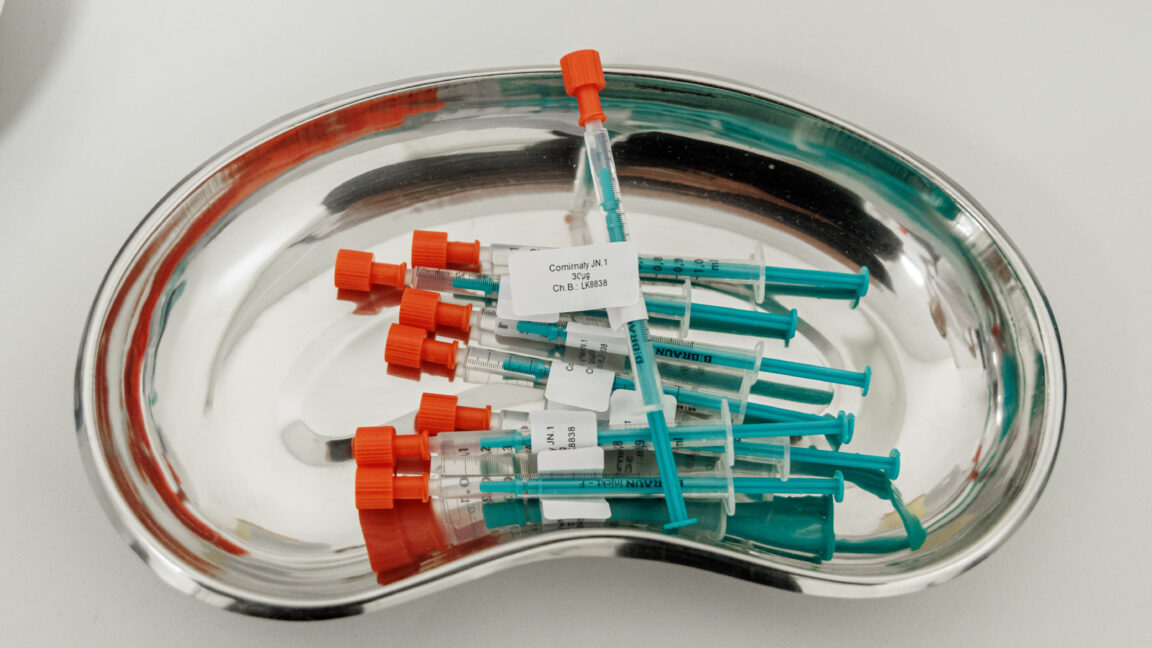Residents in the Southwest District Health in Idaho are no longer able to get COVID-19 vaccines from public health clinics after the district's board of directors voted 4–3 recently to stop administering the shot.
The vote came during a hearing swamped by misinformation and conspiracy theories about the lifesaving vaccines. It's a chilling reminder of how dangerous anti-vaccine sentiment and misinformation have infested communities nationwide, causing vaccination rates to slip across the country and making way for deadly outbreaks of preventable diseases.
Safety net
In a hearing last week, Perry Jansen, the health district’s medical director, gave the only presentation that favored keeping COVID-19 vaccines available through district clinics. He echoed the points that all health experts and major health organizations, including the Centers for Disease Control and Prevention, have pointed out for years: that COVID-19 vaccines have proven to be safe, lifesaving immunizations that are recommended for everyone ages 6 months and up.
While people in Idaho and beyond can get COVID-19 vaccines from private health care providers and pharmacies, Jansen noted that the health district is a "safety-net provider" for more than 300,000 residents in five counties. The district offers affordable medical care with fees on a sliding scale for qualified residents to "minimize poor health outcomes among at-risk populations." While the clinics don't use taxpayer funds to buy or administer the funds—patients pay with either insurance or cash—the district is able to buy the COVID-19 vaccines at a discount, passing the savings on to uninsured residents.
"I think the main thing we want to emphasize is that we do believe in a patient’s freedom of choice for their care," Jansen said, according to the Idaho Statesman. "We’re not talking about mandates for vaccines or anything but the ability for patients to make decisions in coordination with their doctor for their own health."
Dangerous misinformation
The points, however, were dismissed by the overwhelming opposition at the hearing, which argued that the vaccines should not be offered at public health clinics at all. The meeting included multiple presentations of anti-vaccine voices with national reputations for fear-mongering and spreading vaccine misinformation that the vaccines are dangerous. The presenters included Ryan Cole, a pathologist who has falsely claimed that mRNA COVID-19 vaccines cause cancer and autoimmune diseases. In January, Cole had his medical license restricted in Washington state for spreading COVID-19 disinformation and breaking medical standards by prescribing the anti-parasitic drug ivermectin for COVID-19 patients despite the drug's ineffectiveness against the viral illness.
Similarly, there was also a presentation from Peter McCullough, a Texas cardiologist with a lengthy history of spreading COVID-19 vaccine misinformation, disinformation, and conspiracy theories, including that the pandemic was planned and medical authorities were conspiring to suppress ivermectin and the anti-malarial drug hydroxychloroquine.
Then there was also James Thorp, a Florida gynecologist who has spread misinformation about the safety of COVID-19 vaccines during pregnancy. And Renata Moon, a Washington pediatrician who relinquished her medical license after spreading COVID-19 misinformation.
In addition to the anti-vaccine presenters and contributors, there were nearly 300 public comments blasting COVID-19 vaccines. Many people parroted the false information and conspiracies spread by the presenters, saying: "It is common knowledge the COVID-19 shots are poison" and "Ban the Covid Bio Weapon 'vaccine.'" One commenter specifically referenced the Children's Health Defense, a notorious anti-vaccine organization run by Robert F. Kennedy, Jr.
Some commenters seemed to take aim not just at COVID-19 vaccines but all vaccines, writing in to say, "No more promoting ANY 'vaccinations'" and "Stop the shots, stop killing our children!"
Slippery slope
In the hearing, board member Jennifer Riebe (who voted to keep COVID-19 vaccinations available) worried about the potential of a slippery slope.
“My concern with this is the process because if this board and six county commissioners and one physician is going to make determinations on every single vaccine and pharmaceutical that we administer, I'm not comfortable with that," she said, according to Boise State Public Radio. "It may be COVID now, maybe we'll go down the same road with the measles vaccine or the shingles vaccine coverage."
Board Chair Kelly Aberasturi, who also voted to keep the vaccines, argued that it should be a choice by individuals and their doctors, who sometimes refer their patients to the district for COVID shots. "So now, you're telling me that I have the right to override that doctor? Because I know more than he does?" Aberasturi said.
"It has to do with the right of the individual to make that decision on their own. Not for me to dictate to them what they will do. Sorry, but this pisses me off," he added.
According to Boise State Public Radio, the district had already received 50 COVID-19 vaccines at the time of the vote, which were slated to go to residents of a skilled nursing facility.
The situation in the southwest district may not be surprising given the state's overall standing on vaccination: Idaho has the lowest kindergarten vaccination rates in the country, with coverage of key vaccinations sitting at around 79 percent to 80 percent, according to a recent analysis by the Centers for Disease Control and Prevention. The coverage is far lower than the 95 percent target set by health experts. That's the level that would block vaccine-preventable diseases from readily spreading through a population. The target is out of reach for Idaho as a whole, which also has the highest vaccination exemption rate in the country, at 14.3 percent. Even if the state managed to vaccinate all non-exempt children, the coverage rate would only reach 85.7 percent, missing the 95 percent target by nearly 10 percentage points.


